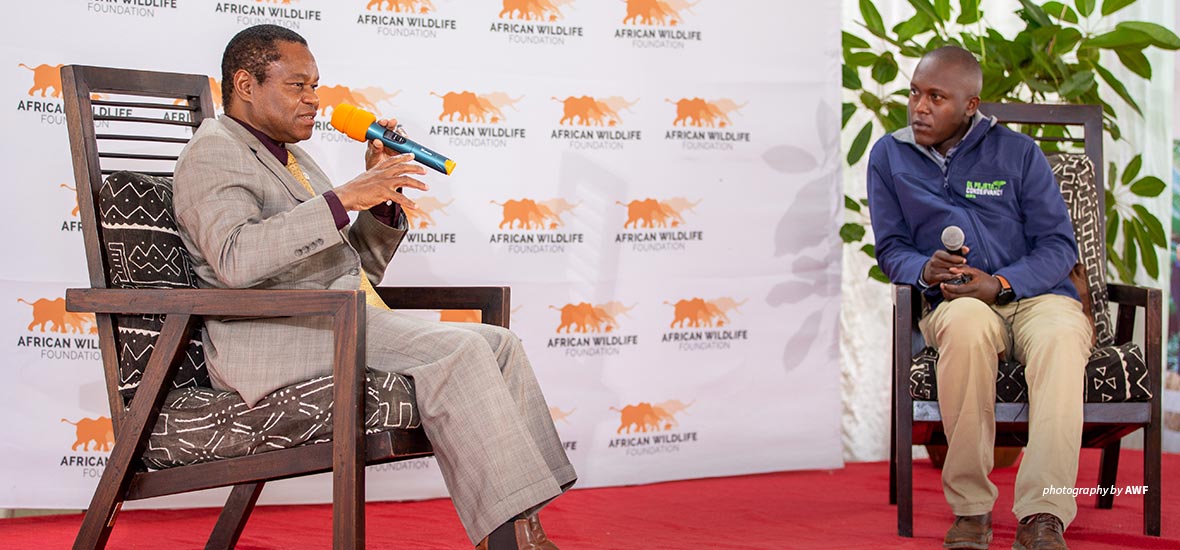AWF youth training reflections: Meet Abraham, a young conservationist leading systemic impact

Abraham Njenga (far right) with fellow participants at the AWF Charles R. Wall Leadership Fellowship workshop in Nairobi, Kenya
This article is written by a fellow from African Wildlife Foundation’s Charles R. Wall Leadership program following practical training sessions in Nairobi, Kenya to build leadership and conservation management skills.
The first time I saw the call for applications for the AWF Charles R. Wall Leadership Fellowship, I was intrigued and could not decide on which of the two programs — leadership and management or policy and governance — would be my perfect fit but after going through the document I finally decided on applying for the Conservation Leadership and Management Fellowship.
After an intense interview, once shortlisted, I got the good news my application had been successful and my journey began.
The objective of the program is to build a generation of young professionals in Africa who have leadership and management skills to lead and influence systemic change in the environmental sector and are grounded in the African context and realities when it comes to environmental matters.
Each pillar has its learning objectives and topics that have been identified to help in building the knowledge and skills gaps being addressed by the program.
Delivery methodology
The structured program combines well-thought-out, blended learning methodologies to deliver the programmatic and learning objectives.
Throughout the nine months, participants will undergo scheduled training on conservation concepts, leadership, and management development.
From June 11-17, 2023, all the participants converged in Nairobi for the commencement of the deep-dive phase for in-person courses on self-leadership, leading purpose-driven teams, and organizational leadership
Tailor-made to equip with knowledge, skills, and tools that will elevate the leadership and management game from 1.0 to 2.0, the sessions helped build an understanding of personal values, strengths, purpose, vision, personality, and how these connect to the professional world so that one can maximize on impact.
The in-person training commenced with a one-on-one session with AWF Vice President, Global Leadership, Frederick Kumah. The highlight was the opportunity to sit with him and ask any questions regarding his experience and how we can cross the hurdles as young conservationists in our different backgrounds and become catalysts of change.

Abraham Njenga (right) interviews AWF Vice President, Global Leadership Frederick Kumah
The program is designed to impart participants with cutting-edge knowledge, skills, and expertise in conservation, leadership, and management that will equip them to lead systemic change in the environment space. The program content is categorized into four pillars: Foundational course on conservation; self leadership; leading purpose-driven teams; and organizational leadership.
The class sessions were structured in a very engaging manner with group work assignments and tasks that require one to “think out of the box” and not be compelled to conventional ways of doing things. Focused group discussions embraced pan-Africanism, allowing us to learn from each other about contemporary issues regarding conservation in the continent while sharing practical examples on lessons learned in the various programs and projects the participants are working on in their home countries.
This program is AWF’s acknowledgment of how the spaces of conservation and environmental sustainability are changing rapidly, requiring open-minded and resilient individuals who can lead systemic change. The program intends to foster collaboration across the continent, as the 2023 cohort brings fellows from 12 African countries from West, Central, Eastern, and Southern Africa. Countries represented in this cohort include Cabo Verde, Benin, Cameroon, Central Africa Republic, Kenya, Rwanda, Uganda, Democratic Republic of Congo, Mauritius, Zimbabwe, Namibia, and South Africa.
Conservation leadership training is not complete without mentorship — and this program is all about that. Participants are learning from conservation practitioners about their journey and asking questions one would not easily get a platform to ask from these top professionals.
If you are an early- or mid-career conservationist, I highly recommend you consider applying for the program, which is a well-thought-out initiative with a key focus on self-leadership, team leadership, and organizational leadership. The fellowship brings together young African professionals from business, NGOs, the public sector, and community-based entities that are leading impact in the environment space.
The Charles R. Wall Conservation Leadership and Management Fellowship will impart you with transformational leadership and management skills needed to lead systemic impact in environmental issues.
This article was originally published on I Am Justice 4 Wildlife
> Learn more about AWF’s Charles R. Wall Conservation Leadership programs